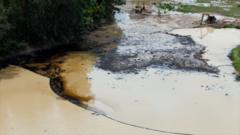Colombian energy giant, Ecopetrol, faces serious allegations of severe environmental contamination as detailed by a whistleblower and corroborated by BBC investigations. An anonymous insider revealed extensive records, indicating that the company has polluted over 800 sites, impacting vital water sources and rich wetlands, while reportedly failing to disclose nearly a fifth of these incidents since 1989.
Despite Ecopetrol's claims of adherence to Colombian laws and sustainable practices, troubling evidence points to repeated oil spills and ongoing pollution. The company’s main refinery, situated along the banks of the Magdalena River, plays a crucial role in the region, yet raises concerns due to the visible pollution that locals have observed, including foul-smelling fish and iridescent oil slicks on water surfaces.
Yuly Velásquez, head of Fedepesan, an organisation representing local fishers, highlights dire wildlife impacts within the area, which is home to endangered species. Observations of dead manatees, turtles, and birds underscore the ecological disaster unfolding amidst allegations of inadequate corporate accountability.
Andrés Olarte, the whistleblower, who left Ecopetrol in 2019 after witnessing disturbing pollution levels, shared extensive data with the Environmental Investigation Agency (EIA) and the BBC. This information revealed a long list of unresolved environmental impacts, suggesting deliberate attempts by Ecopetrol to conceal pollution incidents from government scrutiny.
Ecopetrol's former CEO, Felipe Bayón, denied claims of intentional information suppression, attributing spills to sabotage and asserting improvements in environmental management. However, regulatory data contradicts this narrative by showing consistent pollution incidents over the years, contributing to the devastated ecology seen in local environments.
Evidence suggests that the ongoing threats faced by community members and environmental defenders stem from a culture of violence linked to Colombia's turbulent history and aggressive corporate practices. Many involved in bringing the issue to light, including Velásquez and Olarte, have reported receiving threats and have taken measures to protect themselves, highlighting the perilous situation for those opposing large corporations.
Olarte remains committed to his fight against the company's practices while aiming to shed light on the environmental concerns threatening his community and its biodiversity. In contrast, Ecopetrol underscores its economic significance in Colombia, reflecting the tension between natural resource exploitation and environmental stewardship in a country facing considerable ecological challenges. Velasquez’s assertion—“If we speak and report, we are killed… and if we don’t report, we kill ourselves”—echoes the harsh reality of defending the environment in the face of corporate neglect and societal violence.



















